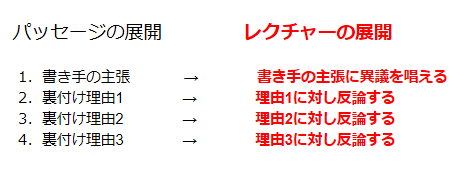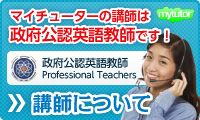
| TOEFL ライティング Integrated = 反論するフレーズ =
Integrated Writingの問題は、「レクチャーの内容を要約することと、
それがどのようにリーディングの内容と関連しているかを述べること」です。

レクチャーの内容がパッセージの内容に対して疑問を投げかける視点で展開されます。
レクチャーで反論していることがわかる フレーズ 例
□ The lecturer takes issue with the main point of the reading that [パッセージの主張]
□ According to the lecture, [レクチャーの内容]. On the other hand, this contradicts what is stated in the reading passage that [パッセージの内容]
□ For these reasons, the lecturer disagrees the argument in the reading.
解答のテクニック
パッセージの内容に対し、レクチャーでの反論点を把握し、それらを
関連付けてエッセイを書くテクニックを身につけつことが大切です。
それでは、パッセージに対するレクチャーでの反論点を示すフレーズが解答文の中で
どのように使われているかをご覧ください。

The lecturer discusses the points made in the text but reaches a different conclusion in each case. For one thing, she states that yes, people are reading less literature then they were in earlier times but this does not equal an immediate decline of culture. On the contrary, in her opinion our culture is simply evolving and changing. Although literature is one of the most obvious elements of culture, there are also lots of other forms of artistic expression in our ever-changing culture, e.g. music. And those elements are not less valuable and less creative than literature and they appeal to more modern concerns than literature.
Also the lecturer disputes the text that says we are going to lose interesting writers of literature. She says that today literature is not interesting enough for the reader! In the lecturers opinion this is mainly due to the fact that modern literature is often written with the intention of being difficult to understand, which does not make it very attractive for the modern reader.
And finally just because people are not reading literature anymore this does not mean they are not reading at all and losing their imagination and empathy; instead there are many other valuable types of books which people are reading, e.g. science textbooks and political analysis. These books can stimulate readers and provide satisfaction and learning.







